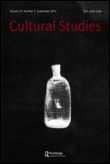
CULTURAL STUDIES
Scope & Guideline
Charting New Territories in Cultural Analysis
Introduction
Aims and Scopes
- Interdisciplinary Approaches:
The journal embraces an interdisciplinary perspective, integrating insights from sociology, anthropology, media studies, and cultural theory to analyze cultural practices and phenomena. - Critical Examination of Power Structures:
CULTURAL STUDIES consistently focuses on the ways in which culture interacts with power, exploring topics such as colonialism, race, gender, and class dynamics in various contexts. - Global Perspectives:
The journal highlights cultural studies from a global viewpoint, showcasing research that addresses issues pertinent to different geographical and sociopolitical contexts. - Cultural Memory and Heritage:
A significant focus is on cultural memory, heritage, and the politics of representation, examining how histories are constructed and contested in contemporary societies. - Media and Technology Critique:
There is a strong emphasis on the role of media and technology in shaping cultural discourses, including the impact of digital platforms, surveillance, and algorithmic governance on everyday life. - Social Movements and Activism:
The journal often explores cultural expressions linked to social movements, activism, and resistance, analyzing how cultural practices can challenge or reproduce societal norms.
Trending and Emerging
- Cultural Responses to COVID-19:
The pandemic has generated a significant body of work examining cultural responses to COVID-19, including the politics of health, biopolitics, and the impact of social distancing on cultural practices. - Race and Intersectionality:
A growing emphasis on intersectionality, particularly regarding race, gender, and sexuality, is evident, as researchers explore how these identities intersect within cultural contexts. - Digital Cultures and Technologies:
There is an increasing focus on the implications of digital technologies on culture, including discussions around algorithmic governance, online activism, and the cultural politics of social media. - Decolonization and Postcolonial Studies:
Emerging themes related to decolonization and postcolonial critique are gaining traction, reflecting a broader academic interest in understanding cultural dynamics in formerly colonized regions. - Nostalgia and Memory Studies:
Themes surrounding nostalgia, memory, and cultural heritage are trending, with researchers investigating how collective memories shape identities and cultural practices in contemporary settings. - Environmental and Ecocritical Studies:
Cultural studies are increasingly addressing environmental issues, exploring how culture engages with ecological crises and the politics of sustainability.
Declining or Waning
- Traditional Media Studies:
There seems to be a waning interest in traditional media studies, particularly those focused solely on print and broadcast media, as the journal's recent issues lean more towards digital media and its implications. - Eurocentric Perspectives:
Themes that center predominantly on Eurocentric cultural studies have become less frequent, indicating a shift towards more inclusive global perspectives that prioritize voices and experiences from non-Western contexts. - Historical Cultural Studies:
Research that strictly adheres to historical cultural analysis without connecting to contemporary issues is appearing less often, as the journal increasingly prioritizes the relevance of cultural studies to current social and political challenges. - Static Cultural Critiques:
There is a noticeable decrease in papers that offer static critiques of culture without engaging with dynamic processes of change, reflecting a move towards analyses that consider cultural practices as fluid and evolving.
Similar Journals

International Journal of Politics Culture and Society
Advancing Critical Understanding of Political and Cultural IntersectionsThe International Journal of Politics Culture and Society, published by SPRINGER, serves as a premier platform for scholarly dialogue across the fields of political science, sociology, and cultural studies. With an ISSN of 0891-4486 and an E-ISSN of 1573-3416, this journal has successfully published rigorous research since its inception in 1987. It features a convergence of critical ideas and empirical studies that explore the intersection of political, cultural, and social dynamics globally. Ranked in the Q2 category for both Political Science and International Relations and Sociology by prestigious metrics, this journal reflects its high impact within the academic community, showcasing articles that hold significant relevance across disciplines. Additionally, it maintains commendable Scopus rankings, placing it in the 76th and 71st percentiles within its respective categories. While this journal operates under a subscription model, it remains committed to facilitating access to important research for professionals, researchers, and students eager to engage with contemporary political and social issues.

CULTURAL CRITIQUE
Exploring the Depths of Cultural DiscourseCULTURAL CRITIQUE is a premier academic journal published by University of Minnesota Press, dedicated to the interdisciplinary exploration of cultural phenomena through the lenses of anthropology, cultural studies, literature and literary theory, philosophy, and sociology. With its ISSN 0882-4371 and E-ISSN 1460-2458, the journal serves as a vital forum for scholars to engage, debate, and disseminate innovative ideas and methodologies that redefine cultural narratives and critiques. Spanning a publication timeline from 2002 to 2024, CULTURAL CRITIQUE holds significance in various academic categories, achieving Q4 rankings in anthropology and sociology and as high as Q2 in literature and literary theory. Its Scopus rankings further reinforce its value, placing it in the 82nd percentile among literature-related journals. Although it currently does not offer open access, this journal is key for researchers, professionals, and students aiming to deepen their understanding of culturally driven debates in the contemporary landscape.

Slovensky Narodopis-Slovak Ethnology
Championing Open Access to Ethnological ResearchSlovensky Narodopis-Slovak Ethnology is a leading academic journal dedicated to the exploration of ethnology and cultural studies, published by the Slovak Academy of Sciences at the Institute of Ethnology. With an Open Access policy since 2013, it strives to make high-quality research readily accessible to a global audience, enhancing the dialogue around Slovak cultural heritage and broader anthropological topics. The journal holds a notable position in the field, currently ranked Q2 in anthropology for 2023, indicating its substantial contribution to the discipline. It is indexed in Scopus, with a current rank of 245 out of 502 in the Social Sciences category, reflecting its value within the academic community. Researchers and students alike can look forward to a rich array of original research articles, reviews, and essays that not only delve into Slovak ethnology but also engage with international perspectives, thereby enriching the understanding of cultural dynamics and practices.
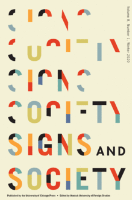
Signs and Society
Fostering Dialogue on Cultural Expression and CommunicationSigns and Society is an acclaimed academic journal published by University of Chicago Press, specializing in the interdisciplinary exploration of semiotics, cultural representations, and communication practices. With an impressive ISSN of 2326-4489 and E-ISSN 2326-4497, this journal has established itself as a credible source of research and insight within its fields. It operates under a robust framework with a convergence of topics from 2015 to 2024, and has achieved notable rankings, including Q1 placements in Cultural Studies, Linguistics and Language, and Visual Arts and Performing Arts in 2023, elevating it to a leading status among its peers. The journal’s impact is reflected in its Scopus rankings, positioning it in high percentiles across diverse categories, making it a vital resource for scholars, practitioners, and students interested in the intricate relationships between signs, society, and culture. Although not an open access publication, Signs and Society remains essential for those seeking to deepen their understanding of communication dynamics and the multifaceted dimensions of cultural expression.
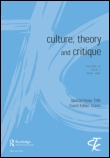
Culture Theory and Critique
Transforming Cultural Understanding Through Rigorous ScholarshipCulture Theory and Critique, published by Routledge Journals, Taylor & Francis Ltd, is a pivotal journal that serves as a conduit for interdisciplinary research and discourse in the realms of Cultural Studies, Sociology, and Political Science. With an ISSN of 1473-5784 and E-ISSN 1473-5776, this journal has carved a niche for its innovative exploration of cultural phenomena and their socio-political implications. According to the latest metrics, it holds a notable position within the academic landscape, ranked Q2 in Cultural Studies and Q3 in Sociology and Political Science as of 2023. With a Scopus rank placing it in the 78th percentile for Cultural Studies, the journal not only contributes significantly to scholarly dialogue but also offers a critical platform for emerging theories and critiques from diverse perspectives. Although it operates under a standard access model, the journal encourages submissions that push the boundaries of current knowledge and engage with pressing cultural issues. Researchers, professionals, and students alike will find that Culture Theory and Critique is essential for fostering a deeper understanding of the dynamic interplay of culture and society, and it stands as a testament to the evolving landscape of cultural analysis.

POETICS
Fostering Dialogue Through Cutting-Edge ResearchPOETICS is a leading academic journal published by Elsevier, focusing on the multidisciplinary fields of Communication, Cultural Studies, Linguistics, Literature and Literary Theory, and Sociology and Political Science. With its esteemed Q1 category rankings across several domains, POETICS showcases cutting-edge research that fosters dialogue and innovation within the arts and social sciences. The journal's commitment to advancing theoretical and empirical understanding of the dynamics between language, culture, and society is evidenced by its impressive Scopus rankings, placing it in the top percentiles among its peers. Covering a wide array of topics, from narrative theory to sociolinguistic analysis, POETICS serves as an indispensable resource for researchers, academics, and students eager to explore the intersection of literature and societal discourse. Situated in the Netherlands, the journal benefits from a rich tradition of scholarly excellence and aims to contribute significantly to the evolving landscape of contemporary research through its ongoing publications until 2024.
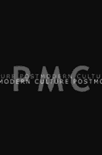
POSTMODERN CULTURE
Illuminating Interdisciplinary Connections in CulturePOSTMODERN CULTURE, published by Johns Hopkins University Press, is a pivotal journal in the fields of Cultural Studies, Literature and Literary Theory, and the Visual Arts and Performing Arts. With a focus on the nuances of postmodern theory and its interdisciplinary applications, the journal has established itself as an essential resource for researchers and scholars seeking to explore contemporary cultural phenomena through innovative critical lenses. Compiling works from 2002 to 2023, it is indexed with notable rankings, including Q2 in Literature and Literary Theory and Q3 in Cultural Studies, reflecting its significant contribution to persistent academic discourse. While not open access, the journal ensures that access to groundbreaking research is available to libraries and institutions, reinforcing its importance in the scholarly community. POSTMODERN CULTURE serves not only as a repository of academic inquiry but also as a catalyst for new ideas, stimulating dialogue among professionals and students alike in understanding the complexities of today's cultural landscape.

DIALECTICAL ANTHROPOLOGY
Engaging with the Pulse of Social DynamicsDIALECTICAL ANTHROPOLOGY, published by SPRINGER, is a prestigious journal within the field of anthropology, recognized for its substantial contributions to dialectical and critical theory in social research. Since its inception in 1975, the journal has carved a niche by exploring the intersections of culture, society, and politics, making it an essential resource for scholars and practitioners. With an impact factor that places it in the Q2 category for both anthropology and arts and humanities, and significant rankings in sociology and political science, it reflects a solid scholarly reputation. The journal operates on a subscription basis, allowing for a wide dissemination of rigorous academic research without open access. With ISSN 0304-4092 and E-ISSN 1573-0786, DIALECTICAL ANTHROPOLOGY serves as a crucial platform for fostering dialogue and advancing knowledge in contemporary anthropology and related disciplines. As a researcher, professional, or student, engaging with the insights presented in this journal will deepen your understanding of the dynamic interplay between structural and agency-oriented perspectives in social contexts.

Social Text
Fostering Interdisciplinary Dialogue for a Deeper UnderstandingSocial Text, published by DUKE UNIVERSITY PRESS, is a leading peer-reviewed academic journal that has established itself as a critical platform for interdisciplinary research in the fields of Anthropology, Cultural Studies, and Gender Studies. With its impressive ranking in the Q1 category for each of these disciplines in 2023, it occupies a prominent place within the academic landscape—ranked 33rd out of 1304 in Cultural Studies and significantly within the top 20 in both Anthropology and Gender Studies. The journal publishes innovative theoretical and empirical work that challenges and expands upon conventional methodologies and perspectives, aiming to foster a deeper understanding of social phenomena. While Social Text is not an open-access journal, it remains easily accessible through university libraries and academic institutions, ensuring that cutting-edge scholarship reaches a wide audience. This journal is a vital resource for scholars, researchers, and students looking to stay informed about the latest trends and debates within the humanities and social sciences.
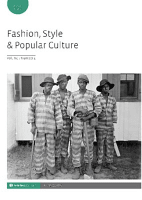
Fashion Style & Popular Culture
Exploring the Threads of Culture and IdentityFashion Style & Popular Culture is a pioneering journal that explores the dynamic interplay between fashion and societal trends within a diverse cultural context. Published by INTELLECT LTD in the United Kingdom, this journal serves as a vital resource for researchers, professionals, and students engaged in fields such as cultural studies, marketing, and social psychology. With an ISSN of 2050-0726 and an E-ISSN of 2050-0734, it provides a robust forum for scholarly discourse, examining the influence of fashion on identity formation, popular culture, and contemporary social practices. Despite not being open access, its esteemed rankings across various quartiles highlight its relevance, particularly in the category of Cultural Studies, where it proudly holds a Q2 status as of 2023. The journal's significance is underscored by its commitment to multidisciplinary research and analysis, inviting contributions that enhance our understanding of material culture and its ramifications on everyday life. As it converges from 2016 to 2024, Fashion Style & Popular Culture continues to cultivate a rich academic dialogue that bridges theoretical insights with practical implications in an ever-evolving cultural landscape.